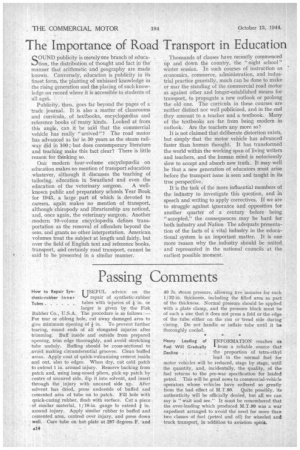The Importance of Road Transport in Education
Page 16

If you've noticed an error in this article please click here to report it so we can fix it.
SOUND publicity is merely one branch of education, the distribution of thought and fact in the manner that arithmetic and geography are made known. Conversely, education is publicity in its finest form, the planting of unbiased knowledge in the rising generation and the placing of such knowledge on record where it is accessible to students of all age.
Publicity, then, goes far beyond the pages of a trade journal. It is also a matter of classrooms and curricula, of textbooks, encyclopdias and reference books of many kinds. Looked at from this angle, can it be said that the commercial vehicle has really "arrived"? The road motor has advanced as far in 30 years as the steam railway did in 100; but does contemporary literature and teaching make this fact clear? There is little reason for thinking so.
One modern four-volume encyclopmdia on education makes no mention of transport education whatever, although it discusses the teaching of tailoring, education in Swaziland and even the education of the veterinary surgeon. A wellknown public and preparatory schools Year Book for 1943, a large part of which is devoted to careers, again makes no mention of transport, although chiropody and librarianship are noticed, and, once again, the veterinary surgeon. Another modern 10-volume encyclopmdia defines transportation as the removal of offenders beyond the seas, and grants no other interpretation. American volumes treat the subject at length and fairly, but over the field of English text and reference books, transport, and certainly road transport, cannot be said to be presented in a similar manner. Thousands of classes have recently commenced up and down the country, the "night school" winter session. In such courses of instruction as economics, commerce, administration, and industrial practice generally, much can be done to make or mar the standing of the commercial road motor as against other and longer-established means for transport, to propagate a new outlook or prolong the old one. The curricula in these courses are neither distinct nor well publicized, and in the end they amount to a teacher and a textbook. Many of the textbooks are far from being modern in outlook. Are the teachers any more so?
It is not claimed that deliberate distortion exists, but simply that the motor vehicle has advanced faster than human thought. It has transformed the world within the working span of living writers and teachers, and the human mind is notoriously slow to accept and absorb new truth. It may well be that a new generation of educators must arise before the transport issue is seen and taught in its true perspective.
It is the task of the more influential members of the industry to investigate this question, and in speech and writing to apply correctives. If we are to struggle against ignorance and opposition for another quarter of a century before being "accepted," the consequences may be hard for both industry and Nation The adequate presentation of the facts of a vital industry in the educational system is an important matter. It is one more reason why the industry should be united. and represented in the national councils at the earliest possible moment.




















































